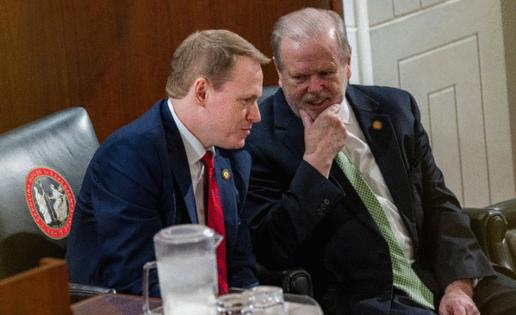NC state budget talks stall among GOP. What that means for raises and tax cuts
Published in News & Features
Any hopes that the North Carolina General Assembly would pass a budget by the end of June have dissipated. What that means is thousands of state employees and teachers won’t be getting raises anytime soon.
Republican House Speaker Destin Hall told reporters after the House session on Tuesday night that “if a budget comes, it’s probably going to be after June at this point.”
Hall said that House voting sessions and committees would wind down next week before lawmakers take a break.
Senate President Pro Tempore Phil Berger gave a similar assessment to reporters on Tuesday.
“At this point, I do not see us getting a budget before we leave at the end of next week,” Berger said, adding that it is “pretty clear” they are not going to do so.
The House and Senate, both controlled by Republicans, have spent weeks at odds over the budget, primarily over key spending issues like tax cuts, raises and big projects like a planned children’s hospital. And as happens more often than not in recent memory, that is again resulting in a summer of drawn-out negotiations.
Hall and Berger have not yet met about the budget, but their staffs have met.
Hall said that the House is still reaching its calendar target of wrapping up policy legislation by the end of June, and would hopefully come back later to pass a budget.
What happens to state employees, teacher pay
When the new fiscal year begins July 1, state employee salaries and base teacher pay set by the legislature will remain at the same spending levels they are at now.
The amount of those raises are part of the divide between the House and Senate. In the House budget, state employees would receive raises of 2.5% in the coming year, including UNC System employees and community college employees. That’s higher than what the Senate and Democratic Gov. Josh Stein proposed.
“Folks are going to continue to be paid. I obviously think our position on the budget is much better. And I think that we need to try to get raises to folks as quickly as we can,” Hall said Tuesday, and cited inflation.
However, there are “some sincerely held beliefs on both sides” of the budget debate, he said.
“I think that every month that we delay, obviously, they don’t get those raises. And so historically, when we have passed a budget, (raises are) retroactive to July 1. And my hope is that we’ll do that this time around,” Hall said, adding that part of wanting to give “substantial” raises to teachers and state employees “is not making them wait on it.”
House GOP budget had majority Democratic support
When the House passed its Republican-written budget in May, 27 Democrats voted for it, including House Democratic Leader Robert Reives. That was arguably the most surprising vote of the 2025 legislative session so far, as recent Republican budgets have garnered only a smattering of Democratic votes.
Instead, a majority of Democrats joined Republicans in support of the budget, even as they called out the reasons they don’t like it, like its funding for private school vouchers. But the proposed raises, and adding triggers before future tax cuts kick in, as well as restoring the back-to-school sales tax holiday, was enough to get their votes.
What happens now
Like Charlie Brown and Lucy playing football, there’s always a chance that Berger and Hall will reach a deal — but it’s rather unlikely. That’s especially true with both men already making their post-June plans.
During previous budget stalemate summers, the House and Senate have returned once a month for a day or two at a time, but not necessarily for voting sessions. Hall sees that happening again this summer.
Unlike the federal government, which can shut down, thanks to a state law, North Carolina’s budget will just continue at the same spending levels as the previous year until action is taken.
Berger talked about the breakdown of negotiations on the budget, at least in June.
“The calendar has turned over several days, and it’s pretty clear that we’re not reaching agreement on various provisions, so I just don’t think we should continue to give folks the impression that we’re working towards getting a budget done. It’s pretty clear that we are not going to do so,” Berger said.
Budget stalemates, when not between the chambers, have been between the General Assembly and the governor. And those stalemates have extended in recent years until November before a budget becomes law.
_____
©2025 The Charlotte Observer. Visit charlotteobserver.com. Distributed by Tribune Content Agency, LLC.







Comments